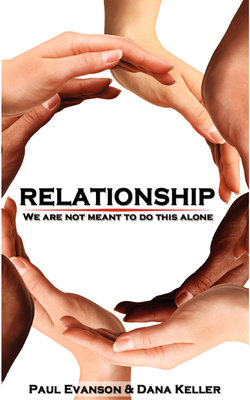Оглавление
Paul Evanson. Relationship
Relationship. Paul Evanson and Dana Keller
Foreword
Introduction
Part 1: Living in Authentic Relationship
Chapter 1: The Meaning of Life
Chapter 2: Reprioritizing
Chapter 3: One Interaction at a Time
Chapter 4: It’s Not About You
Chapter 5: It’s All About You
Chapter 6: Summary of Part 1
Part 2: Relationship Applied
Chapter 7: The Power of Relationship by John Bateman
Chapter 8: Relationship Within Boundaries: Just Say No to Carpooling by Dana Keller
Chapter 9: Relationship in the Workplace: Lessons in Leadership from the Military by Mark Ammons
Chapter 10: Relationships in the Family of God by Casey Peterson
Chapter 11: Relationship and Addiction by Heather Larson
Part 3 - Pressing on: One Interaction at a Time
Chapter 12: How Will Care be Delivered? A Conversation with Steve Mason
Chapter 13: The Relational Church by Dave Browning
Afterthought: Being Loved
Acknowledgements
Contact Information
Отрывок из книги
You may not have time to read this book. With a million other things in life pulling our attentions this way and that—some of them quite real and valuable, like families, jobs, and health, and others maybe not so much—you may not have the time or energy for one more thing. Regardless of which direction or how many you’re being pulled in, it is true that you must choose to spend your time with the awareness and behaviors presented in this book.
Perhaps you already know that:
.....
In the third and final stage of starvation, however, a person becomes listless, apathetic and withdrawn as their body literally devours its own muscles and vital proteins. Paradoxically, as starvation increases the ability of the body to consume normal volumes of food decreases.
In much the same way, most of us are starving for connection with others yet outwardly appear to be calm, “together” and even happy despite our internal pain and discomfort. The ability to receive love becomes muted. It is only occasionally that someone is so completely starved for authentic relationship that we see their pain because their depression and anxiety have become debilitating. Many times their outward suffering makes us feel uncomfortable and instead of reaching out in an authentic way, we give advice like “pull yourself up by your bootstraps” or “just try to think more positively” or even “I’ll be praying for you” without taking the time to give them the real connection that they are starving for.
.....
